Cold War History
Ronald Reagan and George H.W. Bush
1981-1991
Chapter 4
Contents
Chapter 1
1945-1961
Truman - Eisenhower
Chapter 2
1961-1969
Kennedy-Johnson
Chapter 3
1969-1981
Nixon-Ford-Carter
Chapter 4
1981- 1991
Reagan - Bush
The Soviet Union's foundering economy, exacerbated by Reagan policies. and a new, pragmatic Soviet leader led to the collapse of the Union of Soviet Socialist Republics, and the end of the Cold War.
Ronald Reagan
1981-1989
The Reagan first term began with his promise to rebuild the power of the United States and restore its position as the unquestioned world's superpower. The public was solidly behind the new president. He was given the credit for the release of the Iranian hostages on his inauguration day although Carter had made the deal. Reagan continued the Carter anti- communist programs but greatly accelerated defense spending by almost doubling the budget. He revived the B-1 bomber program halted by Carter and began development on the B-2 Stealth bomber at $500,000 per plane. The navy was increased by one-third and began a new program for land and submarine nuclear missiles.
Reagan: "Defense is not a budget item...You spend what you need".
The arms race did not go unnoticed by the Soviet Union and strained their dwindling resources. Reagan, the "great communicator", reiterated the Carter rhetoric on human rights, and his speeches excoriated the Soviets and their system.Thus began the Reagan revolution on the international stage.
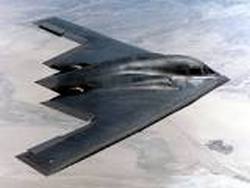
Any honeymoon that usually benefits a new president was shattered on August 19, 1981
when Libyan aircraft attacked American planes over the Gulf of Sidra.
Two enemy planes were shot down, but it extended the enmity between the
western and eastern bloc nations to the North African coast. The
festering problem of communist aggression in Nicaragua that had started
during the Carter presidency was viewed as a security risk by the CIA.
In November, they commenced
aid to the Contras in their ongoing fight with the Sandinista
government. The 19 million dollar aid was covert and specifically
prohibited by the United States Congress even after Reagan's request for aid for the Contra. This problem would later
surface and known as the Iran-Contra scandal.
One of President's rare efforts at restoring detente was his lifting the grain embargo that had been prohibited by President Carter. There was little change in the attitude of the countries under communist control. In Poland, the Communist government (December 13) began a harsh crackdown on the Solidarity Trade Union erasing their gains of the year before. Martial law was imposed and added to the human rights abuses that fueled the Cold War
Lec Walesa in Lenin Shipyard 1980 www.local-life.com
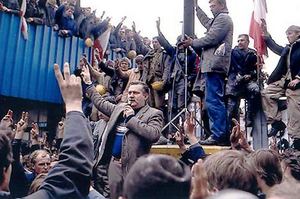
There will always be a question whether President Reagan had knowledge of the illegal support for the Nicaraguan Contras, but we do know that on February 24, 1982, he proclaimed the Caribbean Basin Initiative that pledged support to protect against the overthrow of governments by communist elements.
By mid 1982, there were some public protests regarding Reagan's hawkish views. In June, there were protests in New York's Central Park and a rally in California's Hollywood Bowl. Democrat Senator Ted Kennedy and Oregon Republican Senator Mark Hatfield introduced an armament freeze plan that had no affect on the administration. Reagan's daughter publicly criticized her father.
On November 10, Leonid Brezhnev died. He had been noted as a "hard line" cold war warrior, but a practical leader with whom America could negotiate. Thus there was apprehension in the west when his successor was named as the new General Secretary of the Communist Party. Yuri Andropov had a lengthy resume as a no holds barred defender of communist expansion. In 1956, as a diplomatic counselor in Budapest he called for the Russian tanks to suppress the Hungarian revolt that led to the execution of the Hungarian leader, Imre Nagy. In 1968, he was ruthless in dealing with the Prague Spring in Czechoslovakia. He recommended the Soviet invasion of Afghanistan in December 1979.
On June 8, 1982, President Reagan addressed the British House of Parliament. He harshly referred to the Soviet legacy as ending in the "ash heap of history".
On March 8, 1983, Reagan referred to the Soviet Union as the "evil empire". Andropov may have been the target. Secretary of State Alexander Haig remarked that the USSR "had been seduced by the weakness of the American will and extended itself far beyond the natural limits of its own apparent interests and influence". In the same year, Andropov declared that Regan " finally dispelled all illusion" that an agreement could be made with the Americans. Finally, to top off a year of conflicting speeches, Time Magazine nominated both as men of the year.
President Reagan continued a policy of confrontation although he did leave the door open for arms control, and at the same time felt that it impaired U.S. security. Reagan deemed the policy of detente as morally bereft and even trade agreements were bad policy that only aided the Soviet economy.
At the end of March, Reagan maintained the pressure on the Soviet Union. He proposed the Strategic Defense Initiative, a/k/a "star wars". This was a missile system designed to defend against a missile attack. The plan was a direct violation of the 1972 anti-ballistic missile treaty. That agreement was meant to maintain a balance between the parties to insure the policy of mutually assured destruction. A new defense system would clearly upset the balance. Reagan was not deterred.
On September 1, Korean passenger flight 007 was shot down by a Soviet interceptor when it had strayed off course into Soviet air space. The Soviets claimed it was on a spying mission. An American congressman died with 62 other Americans and the United States joined with most of the world in condemning the action.Reagan referred to that attack as an "act of barbarism". There were calls for reprisals resisted by the president. One Republican, Richard Viguerie, critically said that Reagan spoke loudly but carried a "small stick".
During the fall, Reagan installed new Pershing intermediate range missiles in Great Britain, Italy and Germany. The Soviet response was inevitable, and ended all arms control negotiations.
Reagan carried out his Caribbean Basin initiative on October 25 when an American force landed on the island of Grenada. The intent was to eliminate a Cuban force that had aided a domestically lead junta that executed the duly elected President Maurice Bishop. In a month and a half, the problem was eliminated. Reagan had flexed U.S. muscle but was condemned by the United Nations for a violation of international law. The U.S. public disagreed. Reagan had carried out his threat which included his belief that Americans would no longer enter a war zone with any restrictions. The Cubans were defeated but left evidence of a Soviet anti aircraft gun on the battle field. The Grenada action was contrary to the Nixon doctrine that eliminated the utilization of American troops in other countries to protect against a communist insurgency. Reagan was anxious to display American power, and prove that the Vietnam experience would no longer restrict United States actions.
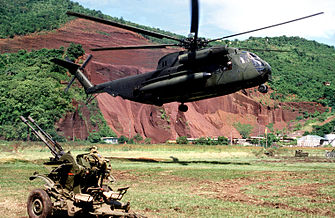
Two days before the invasion of Grenada, American marines stationed in Beirut, Lebanon were attacked in their barracks by a suicide bomber and 283 were killed. Reagan made no effort to seek reprisal. Nor did he support the use of our armed forces in Angola in a civil war that was fueled by the presence of Cuban troops. He also was steadfastly opposed to United States inserting itself directly in Afghanistan which would have meant a direct confrontation with the Soviets. In these instances, President Reagan, although critical of communist aggression, was accused of "sabre rattling" but did not resort to any direct military action.
On February 9, 1984, Soviet leader, Andropov, died and was replaced by Konstantin Chernenko. President Reagan's choice of a new Secretary of State, George Schultz, signaled a greater flexibility in foreign policy. Schultz was believed to be less of a hard liner than his predecessor, Alexander Haig.
In July of this year, the Soviet bloc nations boycotted the summer Olympics in Los Angeles. This was payback for a similar action during the Carter administration that prohibited American participation in the Moscow summer games of 1980. In other action, despite Reagan's request to the contrary, congress cut off aid to the Contras in Nicaragua.
Prime Minister Margaret Thatcher of Great Britain was a kindred spirit with Reagan as a conservative, anti communist. In December 1984, she met with a potential leader of the Soviet Union, Michail Gorbachev who was slated to be the next leader of the Soviet Union. She announced that "We can do business with this man".
In the
following year (March 11, 1985), Gorbachev was elected to lead the Soviet Union. He would be the fourth Soviet leader during the Reagan presidency.(Leonid Brezhnev, Yuri Andropov, Konstantin Chernenko. Mikhail Gorbachev). It fell on the shoulders of Gorbachev, the most pragmatic of the leaders, to save the Soviet Union from economic collapse.
In
August, the Soviets declared a temporary moratorium on nuclear testing.
Reagan dismissed it out of hand. Nevertheless, after several years, in which Reagan played "hard to get", a meeting between the
two was arranged for a Geneva summit for November 19/20. The
discussions ranged over the gamut of the arms race and a mutual desire
for limitations to maintain a balance. Gorbachev's position was that the
Strategic Defense Initiative (SDI) inherently upset the balance that had
previously assured restraining first strike capability. There was no
resolution, but the meetings were amicable and they agreed to future summits. In hindsight, it is evident that the new Soviet leader was wrestling with his domestic problems with a failing economy. The arms race had become an insurmountable problem.
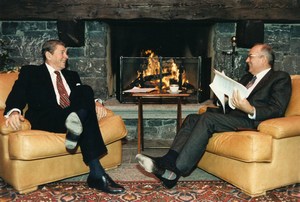
In a sidebar to the Cold War, 1986 began with France challenging Libya's attempt to invade Chad with its uranium resources, and the United States bombed Libya in reprisal for that country's involvement in a series of terrorist attacks that had killed an American soldier in Europe in a discotheque bombing in Berlin aimed at American servicemen.
Reagan and Gorbachev met again in their second summit in the bleak capital of Iceland, Reykjavik (October 11). The Soviet leader pursued the single track of arms reduction and elimination of the SDI program, the Reagan signature initiative. President Reagan insisted on discussing human rights (Jewish emigration to Israel) and Russian activity in Afghanistan. As a result, the discussions merely opened the door for the future, and a more significant summit in the following year. President Reagan continued American aid for the Mujahedin guerrillas in Afghanistan.
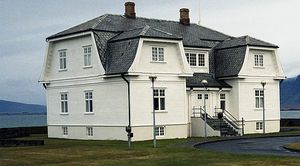
On October 17, President Reagan's request for military and humanitarian aid for Nicaraguan Contras was granted by congress. Two weeks later the disclosure that, in violation of the existing law, aid had been funneled to the Contras in their fight with the left leaning Sandinista government. Moreover, the money utilized was amassed as a result of sales of weapons to the Iranians. CIA Director, William Casey, had lied when he had denied that aid was going to the Contras after it had been cut off by the congress. The scandal involved the White House, but Reagan was not implicated when he claimed no knowledge of the conspiracy. Nevertheless, trust in the administration was diminished. In the following year, a joint investigating committee found that the administration was engaged in "secrecy, deception, and disdain for the law."
It became evident that Gorbachev was a different kind of Soviet leader as accurately characterized by Margaret Thatcher. A man who was also being challenged by his own hierarchy for the progressive changes he was initiating in the Soviet economy and political system--"Perestroika". On June 12, 1987, Reagan visited Berlin and cast this now famous challenge: "Mr. Gorbachev, tear down this wall!" In November 1989, the wall would come down under the watch of President George H.W. Bush.
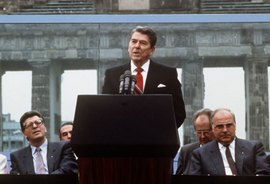 |
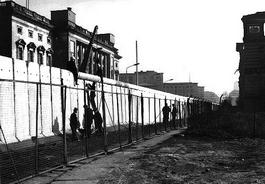 |
On December 8, Gorbachev met with Reagan in Washington to sign an historic agreement: The Treaty Between the United States of America and the Union of Soviet Socialist Republics on the Elimination of Their Intermediate-Range and Shorter-Range Missiles.
The treaty, approved by the U.S. Senate six months later, eliminated nuclear, ground launched weapons with a range of 3400 miles. A look back at all of the inconclusive meetings between the leaders and their respective representatives beginning in 1980 in Geneva, this treaty, with its verification provisions, spelled the beginning of the end of the Cold War.
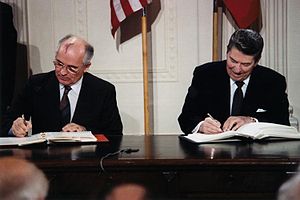
Evidence of the potential end of the Cold War, was presented by President Reagan in Moscow on June 1, 1988. When queried about his "evil empire" description of the Soviet Union years before, his response that the statement was in "another time, another era." This was an acknowledgment of the openness that was seeping into Russia as well as its satellite nations known as "glasnost".
This was further apparent when dissidents in Russia were allowed to freely travel to the United States. A prime example was Andree Sakharov a well known human rights dissident and activist. He had become a strong anti- nuclear proliferation proponent. In 1980, this physicist was internally exiled to Gorky for six years. This city was off limits to all foreigners. He died in 1989.
The final act of the Cold War was left to be closed by the incoming, new president, George Herbert Walker Bush.
George H.W. Bush
1989-1991
The 41st president of the United States was essentially a bystander
to unfolding events that closed the last act of the Cold War. Most of
which would occur in his first year in office. He would have his legacy
confirmed in an unrelated war in the Persian Gulf in 1990. As he assumed the Office of the President,he faced two former, formidable enemies. Russia and China were now amenable to
capitalism. They sought trade with the west and no longer believed that their philosophical Marxist beliefs prevented was a deterrent. The new president entered the oval office in January not quite as sanguine about Gorbachev's motivations and the extent of the Soviet's diminished economy.
On February 2, 1989, Soviet troops completed withdrawal from Afghanistan. They left a country essentially unchanged by their presence except fertile ground for Islamic fundamentalism.
Between June and October Poland discarded all vestiges of a communist controlled government. Hungary finally was free with a new constitution attained without the blood they shed in their revolt against communism in 1956.
East Germany was essentially left to its own devices and on the cusp to unify with West Germany in 1990. On December 3, President Bush met with Gorbachev on Malta. They jointly declared peaceful coexistence. Secretary of State James Baker had conducted lower level meetings and was instrumental in the decision for Bush to meet with Gorbachev. The Secretary had a clearer picture of the Soviet problems than his boss.
Romania was the only European country required to fight their communist masters for freedom. The Soviet Union did not interfere and after the victory brought freedom they executed the former communist leader, Nicolai Ceausescu.
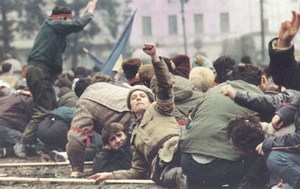
Czechoslovakia had attempted in the Prague Spring protests to obtain reforms and failed (1968), and now elected one of its old leaders, Vaclav Havel as president.
In November 1990, the two leaders, Bush and Gorbachev met again in Paris and concluded the Conventional Forces in Europe (CFE) Treaty. It provided that the Soviets would reduce its vaunted tank forces by 70% and eliminate heavy weapons west of the Ural Mountains.
President Bush was now a believer. In November 1991, he concluded the Start Treaty which reduced nuclear warheads by 30%. However, it took the United States Congress one year to approve the treaty on the eve of the Gorbachev resignation.
On December 25, 1991,Gorbachev resigned and the Soviet Union was dissolved. All of the Baltic countries gained their freedom.
Boris Yeltsin was elected president of Russia and President Bush promised financial aid.
Thus ended the Cold War. The cost of freedom was forty-five years in the making, but somehow the leaders of the United States and the Soviet Union had maintained a basic sanity and never crossed the red line that could have destroyed the world.
In less than one century, the anti-free market experiment of the Union of Soviet Socialist Republics proved a failed vision. In this next century, the world will closely monitor Russian attempts to alter the past and establish a representative government. Although the Soviet Union collapsed, the world was cognizant that the surviving Russian nation still retained an arsenal of over 20,000 nuclear missiles.
In the 21st century, it remains to be seen whether Russia, ruled by an autocratic Vladimir Putin, has learned the lessons of the Cold War.
_______________________________________________________________
Sources and References:
Axelrod, Alan. Real History of the Cold War, Sterling Publishing, New York 2009.
Bjornlund, Britta, the Cold War, Lucent Books, San Diego, California 2002.
Burgon, Michael. Cold War, the Hot Conflicts, Raintree Steck-Vaughn, Austin, Texas 2001.
Central Intelligence Agency.
Cold War Museum
Encyclopedia of the Cold War, Spencer C. Tucker, Ed. ABC CLIO, Santa Barbara, California 2008.
Fariello, Griffen. Red Scare, W.W. Norton & Company Inc. New York, NY 1995.
Freedman, Lawrence. Kennedy's Wars, Oxford University Press, New York 2000.
Freeman, Joshua B. American Empire, Penguin Group, New York, New York 2012.
Gaddis, John Lewis. The Cold War, A New History, Penguin Press, New York 2009.
Gilbert, Martin, History of the Twentieth Century, William Morrow and Company, Inc, New York 1997.
Library of Congress
Nelson, Phillip. LBJ The Mastermind of the JFK Assassination, Skyhorse Publishing, New York 2011.
Pach Jr, Chester J., Richardson, Elmo. The Presidency of Dwight D. Eisenhower, University Press of Kansas, Lawrence Kansas 1991.
Patterson, James T. The Eve of Destruction, Basic Books, New York, New York 2012.
Schulman, Bruce J. The Seventies, The Free Press, New York, New York 2001.
The 1960s. William S. McConnell, Ed. Greenhaven Press, New york, New York 2003.
The Truman Presidency. Michael J. Lacey, Woodrow Wilson International Center For Scholars and Cambridge University Press New york 1989.
United States State Department, Office of the Historian.
Wikipedia
See: Chapter 1 Truman and Eisenhower
History of American Wars | Cold War Timeline | Cold War History